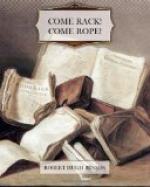His little sermon was plain enough for the most foolish there. He spoke of Christ’s Resurrection; of how death had no power to hold Him, nor pains nor prison to detain Him; and he spoke, too, of that mystical life of His which He yet lived in His body, which was the Church; of how Death, too, stretched forth his hands against Him there, and yet had no more force to hold Him than in His natural life lived on earth near sixteen hundred years ago; how a Resurrection awaited Him here in England as in Jerusalem, if His friends would be constant and courageous, not faithless, but believing.
“Even here,” he said, “in this upper chamber, where we are gathered for fear of the Jews, comes Jesus and stands in the midst, the doors being shut. Upon this altar He will be presently, the Lamb slain yet the Lamb victorious, to give us all that peace which the world can neither give nor take away.”
And he added a few words of exhortation and encouragement, bidding them fear nothing whatever might come upon them in the future; to hold fast to the faith once delivered to the saints, and so to attain the heavenly crown. He was not eloquent, for he was but a young man newly come from college, with no great gifts. Yet not a soul there looked upon him, on his innocent, wondering eyes and his quivering lips, but was moved by what he saw and heard.
The priest signed himself with the cross, and turned again to continue the mass.
II
“You tell me, then,” said the girl quietly, “that all is as it was with you? God has told you nothing?”
Robin was silent.
* * * * *
Mass had been done an hour or more, and for the most part the company was dispersed again, after refreshment spread in the hall, except for those who were to stay to dinner, and these two had slipped away at last to talk together in the woods; for the court was still filled with servants coming and going, and the parlours occupied. In one the ladies were still busy with the altar furniture; in the other the priest sat to talk in private with those who were come from a distance; and as for the hall—this, too, was in the hands of the servants, since not less than thirty gentle folk were to dine there that day.
Robin had come to Booth’s Edge at the beginning of Passion week, and had been there ever since. He had refrained, at Marjorie’s entreaty, from speaking of her to her parents; and they, too, ruled by their daughter, had held their tongues on the matter. Everything else, however, had been discussed—the effect of the squire’s apostasy, the alternatives that presented themselves to the boy, the future behaviour of him to his father—all these things had been spoken of; and even the priest called into council during the last two or three days. Yet not much had come of it. If the worst came to the worst, the lawyer had offered the boy a place in his office; Anthony Babington had proposed his coming to Dethick if his father turned him out; while Robin himself inclined to a third alternative—the begging of his father to give him a sum of money and be rid of him; after which he proposed, with youthful vagueness, to set off for London and see what he could do there.




